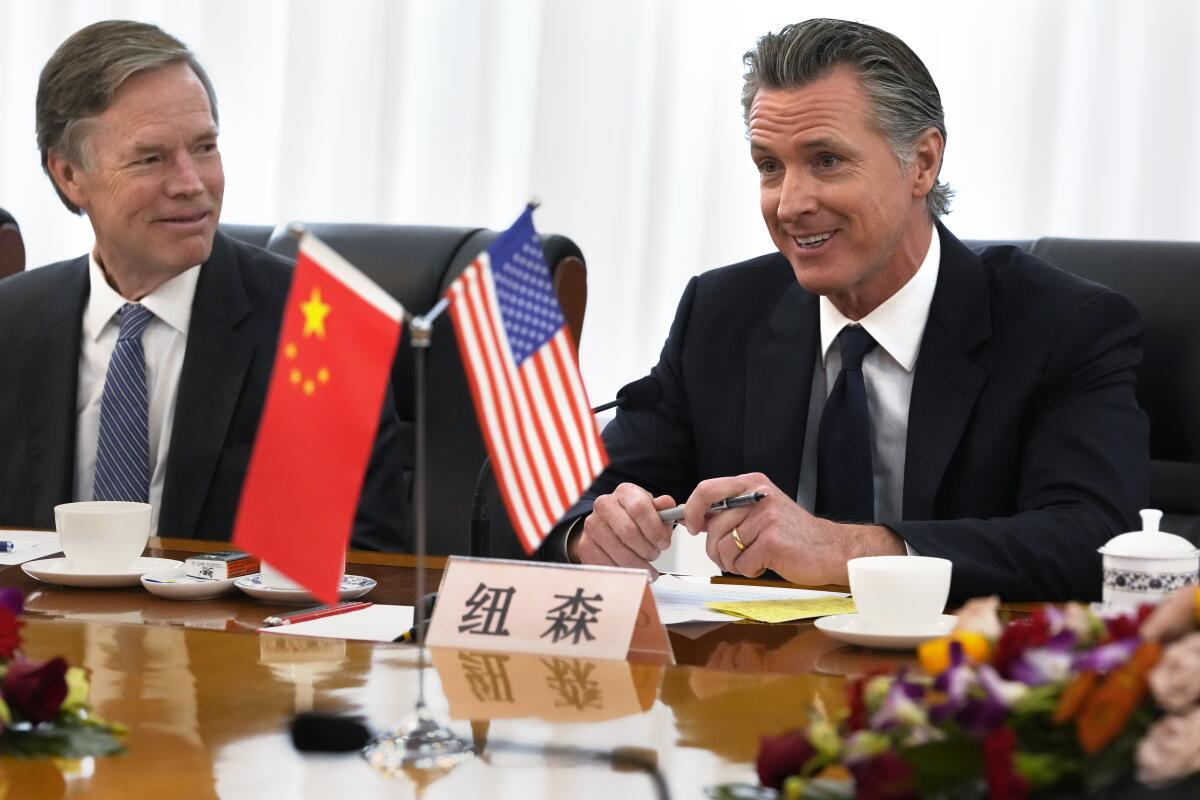California Politics: Highlights of Newsom’s China trip, in style and substance
- Share via
SACRAMENTO — California Gov. Gavin Newsom returned home from China on Sunday night, concluding an experience unlike any other he’s had in five years as governor.
For the first time, Newsom was operating on the world stage and he was doing so at a time of serious global tensions. Between the United States’ acrimonious relationship with China and the escalating war between Israel and Hamas, Newsom navigated diplomatic issues far beyond his normal purview in Sacramento. The stakes felt real.
In today’s newsletter I’ll share some reflections on Newsom’s overseas journey — both the style and the substance. I’m Laurel Rosenhall, The Times’ Sacramento bureau chief, back home after a whirlwind week covering the governor’s trip through China.
Of pomp and photo ops
Newsom was received in grand style, with much more VIP fanfare than he typically garners at home. His long motorcade whizzed down Beijing’s boulevards as traffic was held back at busy intersections. He got a private tour of the Forbidden City, an imperial palace that opened early so Newsom could visit before the usual tens of thousands of visitors per day began filtering through. And in nearly every city he visited, the governor was feted with elaborate six-course banquets on tables brimming with abundant arrangements of flowers and fruit.
Newsom visited five cities in seven days, an agenda packed with meetings, sightseeing and celebrations. Local media mobbed him wherever he showed up, and the stagecraft involved in some of the events was next level. At a wind energy facility in Yancheng, Newsom and a local official signed an agreement to advance clean energy innovation at a ceremony that had all the vibes of a wedding, with tidy white seat covers on the chairs and music playing as politicians walked down the aisle. At the Tesla gigafactory in Shanghai, Newsom was greeted by four parked cars that essentially performed a welcome dance for him — with blinking headlights and automated doors flapping open and closed as speakers pumped an electronic version of “Auld Lang Syne.”
The governor had some splashy moves of his own during a trip heavy with visual spectacles. At a bird sanctuary, the governor and his wife fed red-crowned cranes from the palms of their hands. A glamour shot on top of the Great Wall sent the internet buzzing with memes, and Newsom’s stumble on a schoolyard basketball court showed how photo ops can go wrong.
The most enduring image of the trip, however, will undoubtedly be Newsom’s handshake with Chinese President Xi. The exchange will enhance his image as a leader on the world stage, though critics immediately panned him for catering to a repressive government.
Well-timed climate diplomacy

Newsom’s agenda in China boiled down to one stat that he repeated over and over: The U.S. and China are responsible for some 40% of the world’s greenhouse gas emissions. Unless both nations transition to clean energy, there will be no way to slow climate change — and the floods and heat waves that come with it.
His public comments largely stayed focused on that theme, emphasizing how California approaches the transition as an economic opportunity to grow a new wave of clean energy businesses. Chinese officials hammered their own talking points, saying they support “subnational” climate cooperation between California and Chinese cities and provinces — reflected in the agreements that were signed during the trip — but largely avoiding the bigger picture of global climate negotiations among nations.
However, hopes for a higher-level climate agreement between the U.S. and China loomed over Newsom’s trip. By Friday the governor said excitedly that U.S. climate envoy John Kerry and his Chinese counterpart, Xie Zhenhua, had agreed to meet for talks this week at the Sunnylands retreat near Palm Springs. Later this month, President Biden is set to meet with Chinese President Xi at the Asia-Pacific Economic Cooperation conference in San Francisco. Then the next round of global climate negotiations, known as COP28, begins in December in Dubai. The timing of Newsom’s trip allowed him to position himself as a figure in the run-up to global talks.
Newsom faced criticism from the left and the right for focusing the message of his trip on climate change when human rights are under attack by China’s Communist government. Newsom said he discussed climate and fentanyl in his meeting with Xi, and that he brought up issues related to human rights and democracy in meetings with other Chinese officials.
Given the strained relations between the U.S. and China, Newsom said focusing on clean energy and climate change is a way to build rapport on an issue both sides have an interest in. China has been aggressive in adopting electric vehicles, an area where California wants to go further as it moves to phase out new gas-powered cars. California has advanced grid battery technology that could help China reduce its consumption of coal.
Discussions about cooperating to fight climate change could eventually lead to broader dialogue between the U.S. and China, Newsom said. He spoke often about his desire to rebuild economic ties between China and California and repeated in numerous speeches throughout the week that, “Divorce is not an option.”
Enjoying this newsletter? Consider subscribing to the Los Angeles Times
Your support helps us deliver the news that matters most. Become a subscriber.
Keeping up with California politics
Column: A lot of Californians loathe both the Democratic and Republican parties
There have always been people who were sour on both parties and desired another significant option. But their numbers have been substantially increasing in recent years, writes columnist George Skelton. And as we approach the 2024 presidential election, one question is whether this growing segment of turned-off voters will even cast ballots, or just snub the contest.
Why the fall of Kevin McCarthy leaves California Republicans in a tough spot
For California Republicans, the election of Louisiana Rep. Mike Johnson as speaker presents a host of potential problems that could make trying to survive in a deep-blue state even harder than it already was.
Supreme Court asked to protect California school officials from critics on Facebook
The Supreme Court heard arguments over whether the 1st Amendment helps or hurts public officials who use their personal Facebook pages to communicate with constituents — and sometimes block their critics. The justices heard an appeal from two San Diego-area school board members who were sued for violating the free-speech rights of a parent after they blocked him from their Facebook and Twitter accounts.
Column: California’s newest senator already proved she’s a rare, selfless politician
Interim U.S. Sen. Laphonza Butler was convinced she could win a full Senate term in next year’s elections. But she concluded, for her, it wasn’t worth the trouble. This was both unusual and refreshing, writes columnist George Skelton.
Column: From the state Assembly to the California Air Resources Board, Hector De La Torre makes his mark
Columnist Gustavo Arellano writes that he’s criticized the air board’s actions as pie-in-the-sky wokery that doesn’t consider working-class folks. “That’s why I wanted to meet De La Torre, who’s now the second-longest serving board member,” he writes. “If anyone can persuade me and my fellow fossil fuel reprobates to give up our gas-powered lawnmowers, luminous bumpers and fleets of carburetor-powered cars, it’s him.”
LA Times Today: California sues Facebook parent Meta over alleged harm to young people
Tech policy reporter Queenie Wong discusses the lawsuit California and several other states filed against Facebook and Instagram’s parent company Meta over its effect on young users’ mental health.
Stay in touch
Did someone forward you this? Sign up here to get California Politics in your inbox.
Until next time, send your comments, suggestions and news tips to capolitics@latimes.com.
Sign up for Essential California
The most important California stories and recommendations in your inbox every morning.
You may occasionally receive promotional content from the Los Angeles Times.







